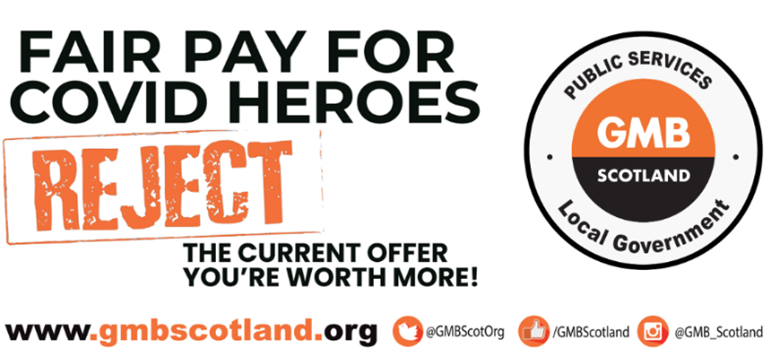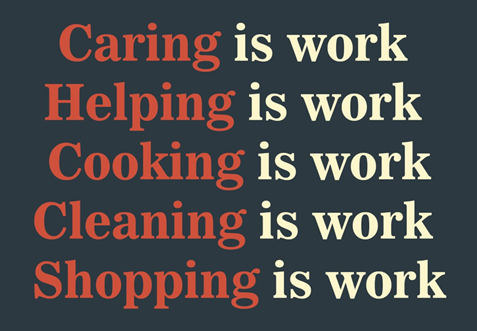Find out more about The Open University's Social Sciences courses
This article belongs to the Women and Workplace Struggles: Scotland 1900-2022 collection.

Background
 Working in already incredibly difficult circumstances, the COVID-19 pandemic exacerbated existing issues around chronic low pay, poor terms and conditions, cost-cutting, and increasing privatisation in the care sector. This has been well documented by the Scottish Trade Union Congress in a report published in June 2022: Scotland’s Social Care Rip Off - Why Scotland can’t afford Privatised Social Care
Working in already incredibly difficult circumstances, the COVID-19 pandemic exacerbated existing issues around chronic low pay, poor terms and conditions, cost-cutting, and increasing privatisation in the care sector. This has been well documented by the Scottish Trade Union Congress in a report published in June 2022: Scotland’s Social Care Rip Off - Why Scotland can’t afford Privatised Social Care Jacky was working as a cleaner in a private care home during the COVID-19 pandemic. She was interviewed at her home by Suki Sangha from the Workers’ Stories Project in July 2022 and the extracts in this article derive from that interview. You can access the interview from the audio link below. Jacky initially shared her story of work during the early stages of the pandemic with the Workers’ Stories Project. Her written story can be found here
Jacky was working as a cleaner in a private care home during the COVID-19 pandemic. She was interviewed at her home by Suki Sangha from the Workers’ Stories Project in July 2022 and the extracts in this article derive from that interview. You can access the interview from the audio link below. Jacky initially shared her story of work during the early stages of the pandemic with the Workers’ Stories Project. Her written story can be found hereThe story reflects on difficulties she encountered and captures her thoughts on working in a sector that claims to be “care first” but is far too often driven by profit. Why did government ministers and bosses across Scotland and the UK clap and cheer for key workers during the pandemic while at the same time force workers to endure poverty wages, conditions that threatened their health and safety and limited statutory rights which further embed workplace exploitation? In recounting her experience of working in the care home Jacky reflects on the difficulties workers encounter when there isn’t strong trade union membership in place- “I think to be quite honest the management started to want rid of me. Even my daughter said you can’t be an unofficial union rep mum because you’re not protected.” Jacky also spoke about the conditions in the care home and the impact COVID-19 had in increasing isolation and in their treatment of residents:
“I did feel awfully sorry for the residents because what was happening was, after we had Covid in the home they kept worrying about it coming in again. So as soon as a resident got a little bit of diarrhoea or something they would say right close the unit. They are all confined to their rooms. And some of the residents were so upset and some of them said do you know what, I would rather risk getting Covid than the way it is just now. They just felt like they were in a prison sentence.”
COVID-19 undoubtedly put additional pressures on care provision, but Jacky’s story also provides an insight into private care as she later reflects on the impact of providing care within a business model.
Looking forward
Jacky eventually left her job in the care home and took up employment as a cleaner in a local supermarket. Looking ahead and thinking about the changes she would like to see in the care sector she says:“They always say care first and they really have to do that. They have to care about the residents first. And the biggest thing I’d like to see change is staff wages increase, there’s no doubt about that. My electricity and gas like most people have almost doubled.”
Jacky also reflected on the discontent between those who run care homes and the residents who live in them, as well as the influence of business models in care provision.
“It was a nurse that was the manager before, but you don’t need to be a nurse in a care home which I think is quite surprising. If you just have the business side of things and she ran it very much like a business, hardly left the office and the new manager didn’t know any of the residents at all and I find that shocking. I can understand that management need to do a lot of paperwork, but you should get to know your residents. It’s a care home.”
Having worked in the care sector and hospitality for much of her life, she would like to see more people join unions and know their rights:
 GMB Scotland members rally in Glasgow October 2021 in pursuit of their ‘£15 per hour’ Campaign. Source: GMB Scotland“Quite a few joined the union. I wouldn’t have won the appeal without the union. When they were trying to dismiss me, apparently when you are dismissing somebody you should always write in an investigatory meeting that ‘this meeting might end in dismissal.’ There are so many protocols, and they didn’t follow any of that.”
GMB Scotland members rally in Glasgow October 2021 in pursuit of their ‘£15 per hour’ Campaign. Source: GMB Scotland“Quite a few joined the union. I wouldn’t have won the appeal without the union. When they were trying to dismiss me, apparently when you are dismissing somebody you should always write in an investigatory meeting that ‘this meeting might end in dismissal.’ There are so many protocols, and they didn’t follow any of that.”
Jacky also hopes there is greater investment in mental health services post-pandemic because she knows that so many people are currently struggling. In concluding her story, she notes alongside the difficulties workers have encountered during the pandemic the crisis has also exposed the “problems of providing care for profit."

"The problem with a lot of care homes even before Covid was that there’s always this thing about saving money and they’re very focused on that in private healthcare and that’s really hard going. The management really do run it like a business." Jacky Yuill




Rate and Review
Rate this article
Review this article
Log into OpenLearn to leave reviews and join in the conversation.
Article reviews